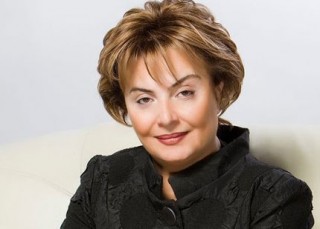A the special event in the Brussels office of newly registered "EU-Georgian, Abkhazian and Ossetian International Movement: for peace, democracy and development" (EUGAO), it's core founder and President, Prof. Nestan Kirtadze, presented to international press the organization, its aims and action agenda for the next year, also her opinion on recent political events in Georgia.
The International Movement will serve as pan-European and global branch of founded in Tbilisi in late 2011 Civil Movement "Georgian-Abkhazian and Georgian-Ossetian House", which main aim is to advance in peace and reconciliation negotiations with Abkhazians and Ossetians in order to define practical plan for building successful infrastructure of economic, social, cultural and academic cooperation. Uniqueness of Mrs. Kirtadze and Civil Movement position is in offering to "freeze" talks about political status of Abkhazia and South Ossetia till the moment "when all parties will be ready to talk about the issue practically, without demagogy and empty promises", and while freezing status - pass the bill of "eternal peace" between Georgians, Abkhazians and Ossetians as civic groups to ensure impossibility of further conflicts in the area. Apart of it, Civil and International Movements are working directly with Russian officials, a "diplomatic luxury" unavailable for any other Georgian politician. Prof. Kirtadze already visited Moscow with official visit in spring 2012, and reached unprecedented breakthrough in negotiations about formats of possible direct dialogue between Georgians, Abkhazians, Ossetians and Russians - possibility of organization in different locations, including Russian cities (for instance in the capital of North Ossetia, Vladikavkaz), Tskhinvali and Sukhumi special mediation meetings with agenda of practical cooperation on the table. Russia, uniquely, is regarded by the Movements as necessary counterpart in these negotiations. Political realism and avoidance of demagogy lays in core of Mrs. Kirtadze approach towards conflict mediation. Next week Prof. Kirtadze will visit Moscow again to discuss further practical cooperation and direct dialogue steps.
Apart of it, International Movement will deal with issues, which are underrepresented in work of Georgian international organizations and diplomatic priorities. Among the issues are promoting Georgian business and helping it to integrate to the EU market with competitive Georgian products, especially in agriculture and food industries; promoting Georgian culture in the European Union; defending rights of Georgians living abroad on full participation in modern Georgia's political, economic, social, academic and cultural life. EUGAO will also serve as informal platform for Abkhazians and Ossetians for breaking through "diplomatic blockade" in order to be capable of implementation direct cooperative projects with the EU entities. For instance, the International Movement plans to work with Abkhazian and Ossetian business as well.
International Movement presented impressive action agenda, which includes multiple visits to Russian capital in the end of this and during next year, where Prof. Kirtadze is supposed to held high level meetings in Russian diplomatic, political and expert circles, as well as with representatives of Abkhazian and Ossetian communities.
Apart of it, International Movement will work on mediation meetings of Georgians, Abkhazians, Ossetians and Russians on different neutral diplomatic and expert platforms in Brussels, Paris, Berlin, New York and another centers, where practical steps towards helping refugees, people in the border regions, most affected by conflict, as well as general improvements in institutionalization of cooperation channels. Improvement of institutions, both political and economic, its quality, stability and predictiveness is core factor for restitution of trust among parties in post conflict reality, highlighted Prof. Kirtadze especially.
Prof. Kirtadze separately talked about importance of the European Union's experience in peace keeping and peace building and its paramount value for Georgian policy makers and strategists. This experience has to be closely researched and used in planning long term measures for stabilization in the region. This is, by the way, one of the aims of the International Movement.
However, she highlighted, the Movement is keeping hope on improvements in course of the new government and is open for a dialogue with future leaders in its new composition,
requiring expertise in mediation and working on course of multilateral integration in the region.
In November 2012 "EU-Georgian, Abkhazian and Ossetian International Movement: for peace, democracy and development" will be presented officially at the launch event in the European Parliament, where its strategy will be discussed with EU policy makers.
Prof. Kirtadze will stay in Brussels until the end of the week and will held meetings with senior officials of several think tanks, on which bases EUGAO will organize mediation meetings during next year.

